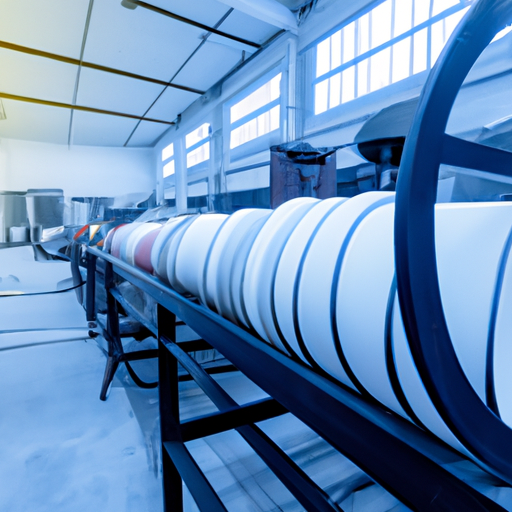Sewing felt rolls, adhesive felt strips, and vinyl production in Chinese factories,
Table of Contents
Exploring the Benefits of Sewing Felt Rolls and Adhesive Felt Strips in Chinese Factories
The use of felt rolls and adhesive felt strips in Chinese factories has become increasingly popular in recent years. This is due to the many benefits that these materials offer to manufacturers. Felt rolls and adhesive felt strips are used in a variety of applications, including insulation, soundproofing, and vibration dampening. In addition, they are also used to protect surfaces from scratches and abrasions.
Felt rolls and adhesive felt strips are made from a variety of materials, including wool, polyester, and acrylic. These materials are highly durable and can withstand a wide range of temperatures and environmental conditions. This makes them ideal for use in factories, as they can withstand the high temperatures and humidity that are often present in these environments.
Felt rolls and adhesive felt strips are also highly cost-effective. They are relatively inexpensive to purchase and can be used multiple times, making them a cost-effective solution for factories. Additionally, they are easy to install and require minimal maintenance. This makes them an ideal choice for factories that are looking to reduce their overhead costs.
Felt rolls and adhesive felt strips also offer a number of other benefits. They are non-toxic and non-flammable, making them safe to use in factories. They are also resistant to water, oil, and other liquids, making them ideal for use in areas where these substances are present. Additionally, they are highly resistant to wear and tear, making them a long-lasting solution for factories.
Overall, felt rolls and adhesive felt strips offer a number of benefits to Chinese factories. They are cost-effective, easy to install, and highly durable. Additionally, they are non-toxic and non-flammable, making them safe to use in factories. For these reasons, felt rolls and adhesive felt strips are becoming increasingly popular in Chinese factories.
Examining the Impact of Vinyl Production on Chinese Factory Workers
The production of vinyl has had a significant impact on Chinese factory workers. This article will examine the effects of vinyl production on the working conditions of Chinese factory workers, as well as the potential health risks associated with the production of vinyl.
The production of vinyl requires the use of hazardous chemicals, such as phthalates, which are known to be toxic to humans. Exposure to these chemicals can cause a variety of health problems, including respiratory issues, skin irritation, and reproductive issues. In addition, the production of vinyl often involves the use of high temperatures and long hours, which can lead to fatigue and other health issues.
Chinese factory workers are often exposed to these hazardous chemicals and working conditions without adequate protection. Many workers lack the necessary safety equipment, such as respirators and protective clothing, and are not provided with adequate training on how to handle hazardous materials. This lack of protection can lead to serious health issues for workers, including respiratory illnesses, skin irritation, and reproductive issues.
In addition to the health risks associated with vinyl production, Chinese factory workers are often subject to poor working conditions. Many workers are paid low wages and are not provided with adequate benefits or job security. Furthermore, workers are often subject to long hours and dangerous working conditions, which can lead to fatigue and other health issues.
The production of vinyl has had a significant impact on Chinese factory workers. The hazardous chemicals used in the production of vinyl can lead to serious health issues, and the poor working conditions can lead to fatigue and other health issues. It is important that Chinese factory workers are provided with adequate protection and training to ensure their safety and well-being.
Investigating the Quality Control Processes for Sewing Felt Rolls and Adhesive Felt Strips in Chinese Factories
The quality control process for sewing felt rolls and adhesive felt strips in Chinese factories is an important factor in ensuring the safety and reliability of these products. As such, it is essential to understand the various steps involved in the process.
The first step in the quality control process is the inspection of raw materials. This involves examining the materials for any defects or inconsistencies that could affect the quality of the finished product. The materials are then tested for their physical properties, such as strength, flexibility, and durability. If any of these properties are found to be inadequate, the materials are rejected and replaced with better quality materials.
The next step is the production process. This involves the cutting, stitching, and assembly of the felt rolls and adhesive felt strips. During this process, the workers must ensure that the materials are cut and stitched accurately and that the adhesive is applied correctly. The workers must also check for any defects or inconsistencies in the finished product.
The final step in the quality control process is the testing of the finished product. This involves testing the felt rolls and adhesive felt strips for their physical properties, such as strength, flexibility, and durability. The products are also tested for their chemical properties, such as resistance to water, heat, and other environmental factors. If any of these properties are found to be inadequate, the products are rejected and replaced with better quality products.
By following these steps, Chinese factories can ensure that their sewing felt rolls and adhesive felt strips are of the highest quality. This helps to ensure the safety and reliability of these products, which is essential for the satisfaction of customers.
